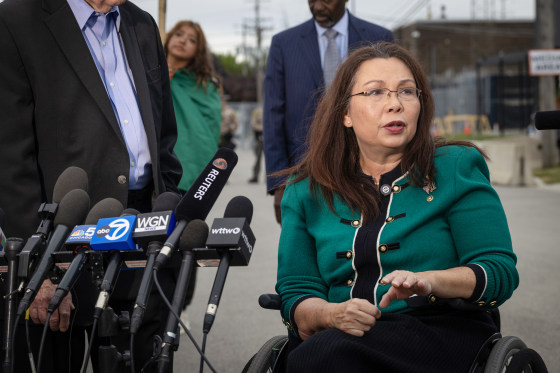Sen. Tammy Duckworth, D-Ill., and at least a half a dozen other senators are calling on the U.S. Department of Education to pressure immigration authorities to refrain from carrying out immigration enforcement within 1,000 feet of any school property, citing recent classroom disruptions in the Chicago area.
On Friday, they sent the letter, first provided to NBC News, to Education Secretary Linda McMahon, demanding that she step in and ask the Department of Homeland Security to curb its operations around schools.
“Federal agents continue to use unwarranted, excessive levels of force around Chicago, demonstrating an alarming lack of care or regard for the health and wellbeing of children, particularly by conducting unfocused, inflammatory operations within close proximity of school grounds,” the senators wrote in the letter. “We demand you pressure your colleague, Secretary of Homeland Security Kristi Noem, to reinstate restrictions on Federal immigration enforcement operations in and around places of education.”
The letter asks for “common sense” civilian immigration policing around schools, arguing that “if society can agree that alcohol, tobacco and drugs should be kept at least 1,000 feet away from our schools, surely we can agree that tear gas—a chemical weapon which causes burning, pain, skin inflammation and respiratory distress—and other violent DHS tools and tactics also belong on that list.”
Other Democratic senators who signed the letter were Angela Alsobrooks of Maryland; Catherine Cortez Masto and Jacky Rosen, both of Nevada; Kirsten Gillibrand of New York; Cory Booker and Andy Kim, both of New Jersey; and Ed Markey of Massachusetts.
Last week, NBC News detailed incidences of immigration activity around schools, including one where tear gas drifted toward a school playground, forcing students back inside the school. Teachers also relayed the fear their students felt inside the classroom.
The letter asks that federal agents operating in the Chicago area specifically be prohibited from carrying out “Operation Midway Blitz” within 1,000 feet of public and private schools.
When asked by NBC News if the department would consider a policy of avoiding immigration activities near schools because of schoolkids playing outside during recess and other students reporting feeling fearful in the classroom, a Department of Homeland Security spokeswoman did not answer the question.
“Why was the tear gas deployed? Because of violent rioters,” DHS spokesperson Tricia McLaughlin responded in an email. “This is not that hard.”
Witnesses of the incident in question have given a different account of how it transpired, saying the crowd was not violent.
The letter detailed two incidents that took place recently in Chicago, one on Oct. 3, “700 feet from Funston Elementary School during the lunch hour—forcing the school to shift recess and activities inside for the rest of the day to protect students from the gratuitous use of chemical agents near an elementary school.”
The second was on Oct. 8, the letter states, involving federal agents who “forcefully dragged two women out of a car in front of a school on the West Side of Chicago, violently detaining them without presenting a warrant, as children and parents watched on in horror.”
McLaughlin, the DHS spokeswoman, previously said in a statement about the incident that those in the car “were driving recklessly, including weaving between lanes and putting other motorists at risk. Following the driver abruptly stopping in the middle of traffic near a school, law enforcement approached the vehicle. The occupants refused to exit the vehicle and follow law enforcement commands.”
Earlier this month, American Federation of Teachers President Randi Weingarten traveled to Chicago in part to talk to union members about how to navigate the immigration crackdowns.
At a roundtable inside Funston Elementary, Weingarten told members that the union was doing what it could to keep students and the community safe. In Chicago, immigration officers are barred from entering city schools to carry out activities, and from doing so on city-owned property.
“School should be an ICE-free zone, just like it’s a gun-free zone and a drug-free zone,” Weingarten said.


